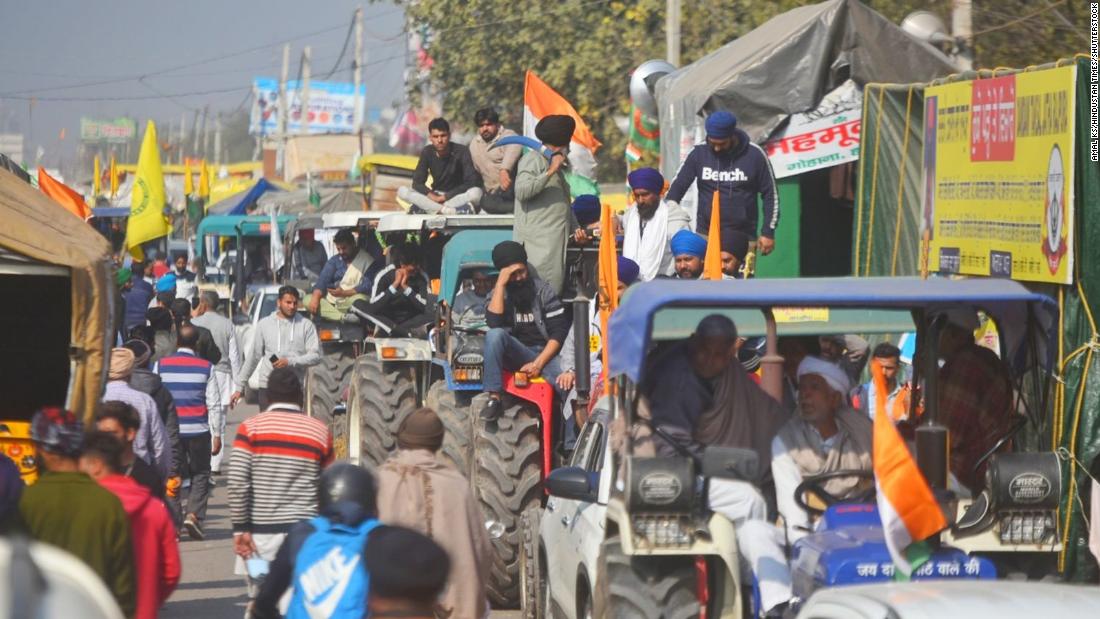Online access would be suspended in at least 14 of the 22 districts in the state of Haryana, near New Delhi, until 5 pm Monday, according to the Haryana Department of Information and Public Relations on Sunday. That order was imposed on Tuesday in three districts of Haryana for 24 hours, but has been extended every day since then.
A 48-hour internet shutdown was also imposed in three other areas around Delhi’s borders on Friday night, with India’s Ministry of Internal Affairs saying the move was “in the interest of maintaining public safety and preventing public emergencies “
According to the authorities, the blackouts should have stopped on Sunday night, but Paramjeet Singh Katyal, a spokesman for Samyukta Kisan Morcha, a body representing protesting farmers, said the internet was still not working on Monday. .
Internet restrictions came after violent scenes last week, while demonstrations continued against three agricultural laws passed in September. Since the end of November, hundreds of thousands of protesters have gathered outside New Delhi to protest the changes they claim have not been consulted about and which will damage their livelihoods.
Dozens of police were injured and a protester died when a tractor overturned during protests near Delhi police headquarters, police said on Wednesday. More than 100 protesters are still missing, Samyukta Kisan Morcha said on Sunday.
An Internet shutdown was also imposed in areas around New Delhi, from noon to midnight on Tuesday.
Darshan Pal, a leader of Samyukta Kisan Morcha, condemned the closure of the internet, calling the measures “anti-democratic”.
“The government does not want the real facts to reach the protesting farmers, nor for their peaceful conduct to reach the world,” Pal said in a statement on Sunday. “He wants to spread his false version around farmers. He also fears the coordinated work of farmers’ unions in different protest places and is trying to cut off the media between them.”
However, farmers are still joining the protests, said Katyal de Samyukta Kisan Morcha on Monday. “Usually, these village groups work against each other, but this time they came together for the collective struggle,” said Katyal.
Additional deputy commissioner of police in Delhi, Jeetendra Meena, said the police had deployed more forces at the border should protests occur on Monday.
Concerns about democracy
The strikes also occur in a context of growing concerns about press freedom in India.
On Saturday, Mandeep Punia, a freelance journalist who covered the protests, was arrested at the Delhi-Haryana border, Punia’s lawyer Akram Khan told CNN on Monday.
Punia was detained in court custody for 14 days from Sunday, accused of preventing a public official from doing his duty and voluntarily causing injury and assault or criminal force to dissuade a public official from fulfilling his obligations.
“(O) the accused was merely fulfilling his journalistic obligations and another journalist was arrested along with him, but was released around midnight,” according to a bail application from Punia.
But Meena, of the Delhi police, said that Punia did not carry an identity card when he was caught in a fight between residents and protesters. Meena said that Punia incited the farmers and put pressure on the police.
She said there were reports of mob violence against the protesters and added that it is important for farmers to present their side of the story, as unbalanced reporting can foster negative opinion among the public.
The closure could set a “very dangerous precedent,” she added.
“It’s not like you are removing specific posts or pages that you thought were false or inflammatory, this is you shutting down a whole media outlet.”
Why farmers are protesting
Massive farmers’ protests have been a significant challenge for Modi, as months of demonstrations and protests across the country against his agricultural policy have become an impasse marked by an impasse in negotiations between farmers and their government.
For decades, the Indian government has offered farmers guaranteed prices for certain crops, providing long-term certainty that, in theory, allowed them to make investments for the next crop cycle. The new rules allow farmers to sell their produce to anyone at any price – giving them more freedom to do things like sell directly to buyers and sell to other states.
But farmers argue that the new rules will make them worse off, by making it easier for corporations to exploit farm workers and help big companies lower prices. Although farmers can sell their crops at high prices if there is demand, on the other hand, they may struggle to reach the minimum price in years when there is a lot of supply on the market.
The laws have been so controversial because agriculture is the main source of livelihood for about 58% of India’s 1.3 billion population, and farmers have been arguing for years for guaranteed minimum prices to rise. They are the country’s largest voter bloc – making agriculture a central political issue.
The government held rounds of negotiations with leaders of more than 30 farmers’ unions that oppose the laws – but the negotiations came to nothing.
Last month, India’s Supreme Court issued an order suspending the three contentious agricultural laws and ordered the formation of a four-member mediation committee to assist the parties in the negotiations. But the farmers’ leaders rejected any mediation committee appointed by the court.
According to Samyukta Kisan Morcha, at least 147 farmers died during protests for months from a variety of causes, including suicide, road accidents and exposure to the cold. Authorities have not given an official figure on the deaths of protesters.
